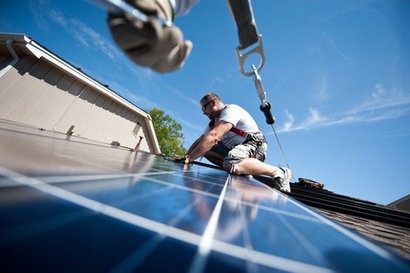
The report, published by think tank Thema1 and authored by Gerard Reid of Alexa Capital and Gerard Wynn, of GWG Energy, used the experience of Germany to project the outlook for solar costs in Britain and impacts on utilities. It was written in the context of the UK government’s plans to force large-scale solar to compete with onshore wind for a smaller pot of support, which will seriously undermine or kill that market.
The report found that the three markets in solar power – large-scale “solar farms”, and commercial and residential rooftop – will be economic without support in Britain within the next decade. Such an outcome assumes progressively falling support under a stable policy regime. It also found that the growth of solar power may threaten electric utilities which fail to transition away from solely supplying electricity, to providing residential energy services and decentralized power. Unsubsidised residential solar power will become cheaper with battery storage, achieving payback periods of little more than 10 years by 2020. The variability of solar power will involve some grid integration costs at higher penetration levels, but these should be weighed against non-market benefits.
Solar PV will be a critical technology in the 21st century, therefore the British government should continue to support the industry until it is fully economic, under a regime of progressive, predictable reduction in support. Policymakers can reduce the impact of solar support on domestic power prices by shifting some price-based support to low-interest credit, and grants for domestic battery packs which boost the value of unsubsidised residential systems. The government should also support measures to optimise the grid integration of renewables, including smart meters and an increasingly computerised grid which uses digital technologies for a faster, deeper, more responsive network.
Solar is in the forefront of new changes in the power market with solar PV overtaking both gas and coal in 2015 to become the number one global power generation technology in terms of annual installations. Solar hardware costs have fallen relentlessly over the last decade meaning that the British market will benefit from a maturing supply chain which will see full system costs converging with Germany.
Renewable energy has overturned power markets in Germany as confirmed by the country’s largest utility, E.ON, which said it was hiving off all its conventional fossil fuel generation to focus on renewables and energy services. Despite criticism from some analysts, lawmakers and utilities, who have described the power market in Germany as broken, E.ON said its new strategy was a result of rising renewable energy competitiveness and investment.
“EON will in the future totally concentrate on renewable energy, the distribution network and customer solutions, and with that concentrate on the most important elements of the new energy world” said E.ON chief executive Johannes Teyssen in a press statement yesterday. “In no other form of power generation is so much capital flowing as in renewables, a trend which will not slow down but accelerate. Renewable energy revolutionises not only power generation but also, together with other technical innovations, the whole role of the customer. He can already produce a large part of his own needs with a solar system. Going forward thanks to energy storage solutions he will be able to become independent of the classical distribution of power and gas. A big driver of the changes in German energy markets is the ever improving maturity and viability, and as a result growth, of renewable energy.”
Guido Axmann, co-founder of Thema1, a Berlin-based think-tank, added that the notion that solar is expensive is over. Thema1 supported the report and its cost projections which found that solar power would be competitive without subsidies as soon as 2020, in the British commercial rooftop market, including schools and offices. The domestic rooftop and large-scale solar markets would also be economic within the next 10 years.
“We are firmly convinced that solar will become the bedrock of the global power system going forward,” added Gerard Reid. “That said the road going forward is unchartered and difficult. Our message to the UK government is to reduce support for solar but do so gradually.”
Once all support for solar is withdrawn, domestic solar will depend on households increasing the amount of solar power they consume, rather than exporting it to the grid. This will avoid users selling surpluses at very low wholesale power prices while buying less mains electricity at much higher, domestic power prices. As costs fall, batteries could play a significant role by allowing households to consumer their own power for several hours after sunset, which could be critical given that in the British domestic market peak demand is in the early evening.
“As battery costs continue to fall, households will be able to deploy solar panels without government support” said Gerard Wynn. “Utilities and policymakers have consistently under-estimated the rate and impact of solar market growth, and this could be another surprise.”
As governments grapple with the aftermath of the global financial crisis, it is vital that they avoid passing excessive costs to consumer power prices. They can do this by steadily reducing solar support and also by policy diversification. For example, grants could be used for residential solar batteries while low-interest credit could be issued by the Green Investment Bank which has not so far invested in solar PV.
Ultimately, solar cost reductions would trigger similar changes in the British power market to those already seen in Germany.
Alexa Capital is a corporate finance company which finances low-carbon energy projects in Germany and Britain delivering corporate advisory and financing solutions across the energy, energy infrastructure and technology sectors. GWG Energy is a consultancy focused on energy and climate policy.
For additional information:

